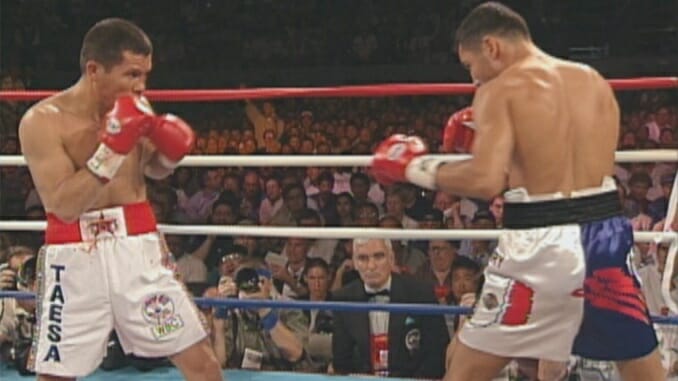Conventional Underdog Doc La Guerra Civil Still Sheds Plenty of Insight
Movies Reviews Sundance 2022
Cultural and generational tensions come to blows in Eva Longoria Bastón’s documentary debut, La Guerra Civil. The film recounts the 1996 “Ultimate Glory” boxing match between Julio César Chávez and Oscar De La Hoya, two Mexican fighters who seemed to represent polarizing images of national identity. Though both fighters were of full-blooded Mexican heritage, the broader Mexican and Mexican-American communities resented De La Hoya for his American citizenship and pretty boy looks. The Sinaloa-born Chavez, on the other hand, was idolized as the epitome of rugged Mexican masculinity.
Incorporating talking head interviews from De La Hoya, Chávez and other prominent cultural figures (George Lopez among them), La Guerra Civil attempts to unpack the central rivalry between the two boxers while also confronting the internalized prejudices within the Mexican community, particularly concerning the sentiment surrounding De La Hoya not being “Mexican enough.” Though the then 23-year-old boxer grew up speaking Spanish with his Mexican immigrant parents, he was largely derided for being a “pocho” by Chávez and his supporters—a derogatory term for those who are clumsy Spanish speakers and detached from their Mexican roots. This unkind perception of De La Hoya fostered a sense of betrayal in the young boxer, who felt his biggest detractor was his idol-turned-opponent Chávez. Meanwhile, the then 33-year-old Chávez saw De La Hoya as an unworthy candidate for passing the torch to. Even in the present-day interview segments, it’s clear that both boxers hold a nagging grudge over the damages done to their egos in the aftermath of the match.
An undeniable animating force in the story, the extensive use of archival footage serves a multipronged purpose in the film. It is a testament to public opinion in the lead-up to the match, chronicles the boxers’ respective rise through the ranks to stardom, and most rivetingly, it presents the anticipated fight between two fighters in their prime. The match itself is bloody, tense and steeped in personal stakes for the fighters and fans alike. The buildup to this moment is gratifying and filled with compelling anecdotes from the boxers, outlining both of their career beginnings, trajectories and struggles evenly and succinctly—despite the 10-year age gap that separates the two opponents. Each had their own adolescent hardships, as well: Chávez was one of 11 siblings and grew up in poverty, while De La Hoya was forced into competitive fighting by his father at the age of five.
Yet for a film directed by a woman that constantly asserts De La Hoya’s specific pull among the opposite gender, surprisingly few women speak throughout the documentary—save for sports reporter Claudia Trejo. There are archival clips of women professing their attraction to the up-and-coming boxer, and a few short recordings of De La Hoya’s mother supporting him during his matches before dying of breast cancer in 1990, but that’s about it. For a sporting event that made such a profound impression on Mexican and Mexican-American communities, it’s odd that there weren’t more women included in the film’s talking head segments. Surely if Longoria Bastón is fascinated by the event and its larger cultural ramifications, many other women must be as well. At the very least, anyone who watches La Guerra Civil will be enthralled by its examination of identity, history and culture, as the film certainly doesn’t contain a gendered slant. Yet the long-documented phenomenon of domestic violence spiking after sporting matches—particularly those where large sums are being gambled such as this one—might also have something to do with the comparative lack of women represented on-screen in the film, though there’s likely a much more nuanced reason for this dearth.
It appears that Longoria Bastón will continue to examine these microcosms of the Latino experience in her future work. The director’s forthcoming narrative debut is slated to be a biopic about Richard Montañez, the contested creator of Flamin’ Hot Cheetos, to be aptly titled Flamin’ Hot. With this directorial pivot, there’s clearly a concerted effort on Longoria Bastón’s part to investigate the larger cultural significance of some of the most intriguing accounts of Latinos in popular culture. Hopefully the biopic approach serves the filmmaker as well as her first foray into documentary does.
Director: Eva Longoria Bastón
Stars: Oscar De La Hoya, Julio César Chávez, Eduardo Lamazon, Jose Luis Camarillo, George Lopez, Claudia Trejos,
Release Date: January 20, 2022 (Sundance)
Natalia Keogan is a freelance film writer based in Queens, New York. Her work has been featured in Paste, Blood Knife and Filmmaker magazines, among others. Find her on Twitter.